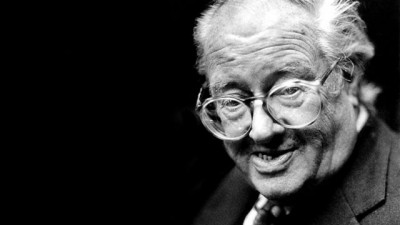| Reviews & Columns |
|
Reviews DVD TV on DVD Blu-ray 4K UHD International DVDs In Theaters Reviews by Studio Video Games Features Collector Series DVDs Easter Egg Database Interviews DVD Talk Radio Feature Articles Columns Anime Talk DVD Savant Horror DVDs The M.O.D. Squad Art House HD Talk Silent DVD
|
DVD Talk Forum |
|
|
| Resources |
|
DVD Price Search Customer Service #'s RCE Info Links |
|
Columns
|
|
|
Voyage Round My Father, A
A made-for-TV movie adapted from John Mortimer's 1963 radio play (later reworked for the stage), A Voyage Round My Father (1982) is a slight but engaging comedy-drama focusing on Mortimer's relationship with an unconventional parent: an aging, cantankerous barrister who copes with mid-life blindness by adamantly refusing to adapt to it or even to acknowledge on any level. His stubbornness is admirable but it also has a devastating effect on his family, especially his martyr of a wife, but he remains a colorful, influential figure whom his son mostly remembers with great fondness and understated amusement.
The TV-movie stars Alan Bates as the son and Laurence Olivier, in one of his last decent roles, as the father. Though the show won much praise when it was new, in retrospect the casting of Bates and Olivier is something of a mixed bag, especially when one considers the various actors who have played those roles through the years, before and since. Still, it's a mostly charming program with some meat to it, a touching memorial to both Mortimer's father and, now, Mortimer himself, who died last year at the age of 85.
The show is really a series of vignettes, little knowing glimpses of life at the Mortimer home in Hampstead, from the time Clifford Mortimer banged his head on a tree branch, instantly detaching the retina in both his eyes, until his death many years later. Early scenes follow John Mortimer as a boy, where he's played in these scenes by Alan Cox (son of actor Brian Cox and best-known for playing John Watson in Young Sherlock Holmes). The story gets a bit sidetracked here, following his amusing adventures after being shipped off to Dragon School in Oxford, where he encounters deceptive classmates and an especially eccentric headmaster (Michael Aldridge). One funny scene has the headmaster trying to discourage the boys from masturbating, but his talk is so crammed with euphemisms the boys have no idea what he's talking about.
As an adult (and now played by Alan Bates) Mortimer, medically unfit for military service during the war, instead becomes an assistant director of propaganda films, and it's here where he meets his first wife, divorcee Elizabeth (Jane Asher, of Roger Corman's The Masque of the Red Death; not long before this she guest-starred in one of the best Rumpole episodes, "Rumpole and the Alternative Society"). Mortimer gives up a career in films and is drawn toward writing, but his father persuades him to take up the bar, for the sake of financial security. (Though not mentioned in the film, Elizabeth also became a writer, best-known for the novel The Pumpkin Eater.)
Like his father before him, Mortimer comes to enjoy handling divorce (and later murder and freedom of speech) cases, which both regard as "a bit of fun," though Elizabeth is less approving.
Clifford, meanwhile, remains a domineering presence throughout. Of his blindness, Mortimer says (in the play's lovely narration), "He simply pretended that nothing had happened." By refusing to learn how to walk on his own, he relies completely on his wife (Elizabeth Sellars) to guide him. By refusing to learn Braille, he relies on her to read him everything (including, in one scene, Arthur Conan Doyle's The Adventure of the Naval Treaty). The result of all this is that she sacrifices her very identity to be at his side from dawn-to-dusk.
Elizabeth dislikes this artificial arrangement, and that she says so plainly impresses Clifford, who takes a liking to her, though she's still concerned about her father-in-law's hold on her husband. Conversely, there's a strange poignancy in Clifford's determination to tend and maintain the family's elaborate garden (filmed in and around the real Mortimer estate), with its blossoming flowers he can never see. Yet there he is, taking in its fragrances and obsessively drowning earwigs in a daily, late-afternoon ritual.
Fans of Mortimer's Rumpole of the Bailey will notice many antecedents to that series. The father-son relationship here is not far removed from barrister Horace Rumpole and his son, Nick. There are many little similarities: Clifford's fondness for Sherlock Holmes; Clifford coaching his barrister son to rise from the bench and silently count to 43 in order to unnerve hostile witnesses before cross-examining them. There's just one scene of Clifford in court but it, too, is very Rumpole-esque. (Ironically, character actor Esmond Knight, actually blind himself, plays a sighted judge.)
After a long and distinguished career on the stage and in films, Laurence Olivier by this time was old and extremely frail, and he had consciously decided to accept roles in terrible films (and, famously in a commercial for Polaroid cameras) strictly for the money. Clifford Mortimer was one of his few good roles from this period, though it's not one of Olivier's best performances. Where the character should be pathetic and magnetic, self-absorbed but also mesmerizing, at times Olivier is merely hammy and indulgent. To the best of my knowledge he never played a character quite like this before, and perhaps didn't quite know (or care) how to approach the role. As Olivier was himself in poor health, he lends more authenticity in scenes that show the encroachment and indignities of old age, but it's not the career-capper it could have been.
Alec Guinness played the blind father in Mortimer's 1971 stage version, which intriguingly co-starred Jeremy Brett as Mortimer and Nicola Pagett as Elizabeth. (Guinness later played a blind butler in the comedy Murder by Death.) In 2006, the play was revived with Derek Jacobi as the father. It's easy to see how all of these actors might come off better than those in the 1982 film, though this Voyage Round My Father still has many fine moments peppered throughout.
Video & Audio
Filmed in 16mm (both exteriors and interiors), A Voyage Round My Father is presented in an acceptable full-frame transfer that's above average compared with other 16mm TV productions from the period. The Dolby Digital stereo (the show's score seems to have been remixed at some point) is likewise okay; optional English subtitles are included.
Extra Features
The lone extra are short text biographies of Mortimer, Bates, and Olivier. These are a bit more detailed than usual, though it's still not much of a supplement.
Parting Thoughts
If you're a fan of Rumpole of the Bailey, chances are you'll find this program of some interest. It's not as good as its reputation suggests but still fitfully charming and interesting throughout. Recommended.
Stuart Galbraith IV's latest audio commentary, for AnimEigo's Musashi Miyamoto DVD boxed set, is on sale now.
|
| Popular Reviews |
| Sponsored Links |
|
|
| Sponsored Links |
|
|
| Release List | Reviews | Shop | Newsletter | Forum | DVD Giveaways | Blu-Ray | Advertise |
|
Copyright 2024 DVDTalk.com All Rights Reserved. Legal Info, Privacy Policy, Terms of Use,
Manage Preferences,
Your Privacy Choices | |||||||














